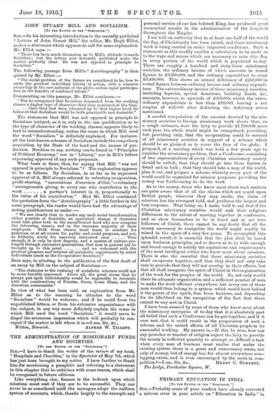THE ADMINISTRATION OF MISSIONARY FUNDS AND SOCIETIES.
. [To THE EDITOR Or TEN "SPECTATOR."]
have to thank the writer of the review of my book, " Hospitals and Charities," in the Spectator of May 7th, which has just been brought to my notice. I have further to thank him for mentioning a pamphlet and referring to a statement in this chapter that he criticises with some reason, which shall be recognised in future editions.
Like everything else, finance is the bedrock upon which missions must- rest if they. are to be successful. They can never be so considered until the managers adopt the uniform system of accounts, which. thanks largely to the example and
personal service of our late beloved King, has produced great economical results in the administration of the hospitals throughout the Empire.
I am told on authority that in at least one-half of the world the flag of Christianity has been raised, and there missionary work is being carried on under improved conditions. Such a statement as this readily enables a calculation to be made as to the ways and means which are necessary to raise this flag in every portion of the world which is populated to-day. There are roughly a hundred and sixty-three missionary societies, the ordinary income of which amounts in round figures to £3,200,000, and the ordinary expenditure to some £3,450,000. This shows an annual deficiency of £2.50,000 in round figures between ordinary income and ordinary expendi- ture. The extraordinary income of these missionary societies, including legacies, special donations, building funds, &c., amounts, however, to upwards of £300,000, whilst the extra- ordinary expenditure is less than £18,000, leaving a net surplus of £32,000 after deducting the deficiency above mentioned.
A careful computation of the amount devoted by the mis- sionary societies to foreign missionary work shows that, on a rough estimate, were the laity to provide £1,750,000 more each year, the whole world might be evangelised, providing,
but providing only, that the co-operation could be secured of all missionary societies in support of a scheme which should be so planned as to cover the face of the globe. I proposed, at a meeting which was held a few years ago to consider the missionary problem, that a Conference consisting of two representatives of every Christian missionary society should be called; that they should go into these figures in detail and in bulk ; that they should take a map of the world, plan it out, and prepare a scheme whereby every part of the world could be organised for mission purposes, providing the money was forthcoming to do the work.
As to the money, those who know most about such matters are quite aware that of all the claims which are urged upon British people, wherever they may reside, the claim of missions has the strongest hold, and produces the largest and best response. That being so, I make bold te say that if the Christian missionary aooieties would sink their religious differences to the extent of meeting together in conference, and so show themselves to be in heart and in act true followers of Christ, there cannot be any doubt that all the money necessary to evangelise the world might readily be raised in the space of a very few years. To accomplish this splendid result, it is essential that the plan shall be based upon business principles, and so drawn as to be wide enough and broad enough to satisfy the aspirations and requirements of the most intelligent critics who know most about missions. There is also the essential that these missionary societies shall co-operate together, and that they shall not only take care to provide that they will not overlap in their efforts, but that all shall recognise the spirit of Christ in this organisation of the work for the peoples of the world. So, not only would there be adequate organisation and a sufficient number of men to make the work efficient everywhere, but every one of those men would then belong to a system which would have behind it the power of the spirit, free from factions, and depending for its life-blood on the recognition of the fact that there cannot be any sect in Christ.
I have been assured by some of those who know most about the missionary enterprise of to-day that it is absolutely past all belief that such a Conference can be got together, and if it ever met, that it could result in the preparation of such & scheme and the united efforts of all Christian people in its successful working. My answer is,—If this be true, how can any preacher or teacher of religion expect the laity to provide the money in sufficient quantity to attempt so difficult a task when every man of business must realise that under the existing system there is a great and unnecessary waste, not only of money, but of energy too, for almost everywhere over- lapping exists, and is even encouraged by the sects in com- petition P—I am, Sir, &c., HENRY C. BURDETT. The Lodge, Porchester Square, W.










































 Previous page
Previous page